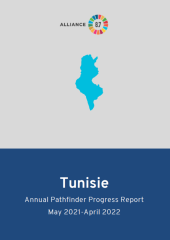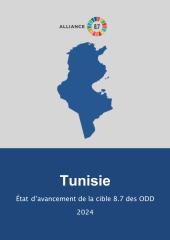Learn more about Tunisia
Priorities
- Develop an information system for data collection and sharing among relevant public institutions. The available information and existing monitoring systems at the level of each ministerial department involved in the fight against child labour should be mapped. A regulatory framework for the collection and sharing of data should be put in place. A joint strategic plan between the Ministry of Education and the Ministry of Vocational Training should be developed, and the data collection of information in private schools should be institutionalized.
- Develop a Child Labour Monitoring system at the national and regional levels for a better synergy among actors. Pilot evaluations and comparative experiments should be conducted, focal points at the level of the regional commissions should be designated, and structures adapted to the needs of children removed from child labour should be developed. Relevant procedure manuals should be prepared, in addition to regulatory texts and coordination protocols. A green line dedicated to the reporting of child labour cases should be established.
- Improve the procedures and tools for labour inspectors to identify children, especially those in the informal economy. Proposals for regulatory texts to frame the intervention of labour inspectors in the informal sector should be elaborated, and a pilot experiment on child labour inspection of should be carried out in the informal sector in Greater Tunis.
- Capitalize on and reinforce the capacity of student support service to sensitize children to child labour issues. Members of existing student support services should be trained on child labour issues to be able to sensitize students against it. The issue should be incorporated into school curricula and pre-service teacher training.
- Harmonize internal laws related to human trafficking and child labour with mechanisms for law enforcement. Capitalizing on the work already done by the National Agency for Combating Trafficking in Persons, the exchange of information between relevant stakeholders should be ensured, and necessary legislative reforms concerning employment promotion should be introduced.
- Clarify and expand the role of labour inspectors, and carry out regular control visits of places of exploitation. A circular on the role of labour inspectors should be adopted to dispel any legal uncertainties. A detailed guide should be developed to facilitate the work of labour inspectors. Coordination between the Public Prosecutor, child protection delegates, and labour inspectors should be enhanced.
- Guarantee the protection and access to justice of irregular migrants who are at risk or currently involved in forced labour or human trafficking. The legislative framework should be modified to eliminate any discrimination against migrants. Awareness-raising campaigns are needed to promote migrants’ resort to migration centers.
- Conduct a study of child exploitation. Further in-depth research on child exploitation is needed to guide action on this issue.
- Build the capacity of the relevant actors. In order to help them realize their respective missions, the technical capacity of relevant actors should be enhanced through training, regional consultations, and awareness-raising campaigns.
Progress
- Launch of the "Sauvez l'Innocence" child labour program in Sfax, supported by the ILO as part of the "Tous contre le travail des enfants" PROTECTE project.
- Finalization and publication of an intervention guide on child labour, providing a conceptual framework for coordinating research and information gathering on child labour at local and regional levels.
- A technical model for a child labour monitoring system (SSTE) is finalized in the Sfax and Jendouba regions.
- Handling cases of child labour: The centers for social defense and integration took on 445 cases of child labour, including 10 cases of the worst forms of child labour. Social promotion structures handled 179 cases of child labour.
- Workshops and training on combating child labour: Workshop in the Hammamet region by the PROTECTE project to strengthen the synergy of players and the coordination of prevention, awareness-raising and monitoring actions aimed at reducing child labour; Workshop to train labour inspectors on standards, the role of labour inspectors in combating child labour, and the importance of social protection in eliminating child labour.
- Measures taken by the Tunisian government to facilitate residence procedures for sub-Saharan students and to respond to the voluntary return of irregular migrants.
- Training to combat human trafficking and migrant smuggling: Organization of a multidisciplinary training course in southern Tunisia, targeting health professionals, social workers, psychologists and representatives of civil society, as part of the fight against human trafficking and migrant smuggling; Capacity-building for the staff of the Instance nationale de lutte contre la traite des personnes through a visit to exchange best practices with the Burundian Commission nationale de lutte contre la traite des personnes.
Child Labour
- Setting up an information system for collecting and sharing data between the various public structures involved
- At the level of the two pilot regions, Sfax and Jendouba, mechanisms for the exchange of information and good practices between the focal points representing the various intervening public structures have been set up. This has been consolidated with the creation of an intervention guide on child labour which will enable users to have a conceptual framework in order to coordinate research and the collection of information on child labour at the local and regional levels.
- At the level of the two pilot regions, Sfax and Jendouba, mechanisms for the exchange of information and good practices between the focal points representing the various intervening public structures have been set up. This has been consolidated with the creation of an intervention guide on child labour which will enable users to have a conceptual framework in order to coordinate research and the collection of information on child labour at the local and regional levels.
- Establishment of a Child Labour Monitoring System (CLMS) at central and regional level, allowing for better synergy between stakeholders
- Regional and local focal points have been set up (180 focal points) representing the various bodies involved in the fight against child labour. Creation of a directory of focal points representing the various bodies involved in the fight against child labour.
- Regional and local focal points have been set up (180 focal points) representing the various bodies involved in the fight against child labour. Creation of a directory of focal points representing the various bodies involved in the fight against child labour.
- Improving procedures and tools for the identification of child labour situations by labour inspectors in the informal economy
- The Tunisian government has submitted to the ARP (Assembly of People’s Representatives) Convention 129 on labour inspection in the agricultural sector.
- The Tunisian government has submitted to the ARP (Assembly of People’s Representatives) Convention 129 on labour inspection in the agricultural sector.
- Capitalise on and enhance the role of student support units to ensure better awareness and guidance against child labour
- Continuation of the security programme for educational establishments and their protection from various assaults. Implementation of programmes to combat poverty, early school leaving and child labour.
Child Labour
- Launch of the second report on the situation of human trafficking in Tunisia (June 2019)
- Development of a “monitoring model” on child labour to facilitate a more fluid and interoperable information and data transfer system (since May 2019)
- Piloting the monitoring system developed as part of the “All against child labour” in North-Western and Central regions of the country.
- Adoption of a new list of hazardous work prohibited for children under 18 years of age (April 2020)
- Elaboration of a TV channel to raise awareness against child labour
- Institutional capacity building has been the main field of intervention since March 2019, with the implementation of several training cycles and the development of training materials on child labour and awareness-raising.
International Instruments
| Área | Ilo Instrument | Estado | Ratification date | CEACR comments |
|---|---|---|---|---|
| Child Labour | C138 Ratification of C138 - Minimum Age Convention (1973) |
In Force | 19 Oct 1995 | |
| Child Labour, Forced Labour, Human Trafficking, Modern Slavery | C182 Worst Forms of Child Labour Convention (1999) |
In Force | 28 Feb 2000 | |
| Child Labour, Modern Slavery | C029 Forced Labour Convention (1930) |
In Force | 17 Dec 1962 | |
| Forced Labour, Human Trafficking, Modern Slavery | P029 Protocol of 2014 to the Forced Labour Convention (1930) |
|||
| Forced Labour, Modern Slavery | C105 Abolition of Forced Labour Convention (1957) |
In Force | 12 Jan 1959 | |
| Child Labour, Forced Labour, Human Trafficking, Modern Slavery | C143 Migrant Workers (Supplementary Provisions) Convention (1975) |
|||
| Child Labour, Forced Labour, Human Trafficking, Modern Slavery | C181 Private Employment Agencies Convention (1997) |
|||
| Freedom of Association | C087 Freedom of Association and Protection of the Right to Organise Convention (1948) |
In Force | 18 Jun 1957 | |
| Freedom of Association | C098 Right to Organise and Collective Bargaining Convention (1949) |
In Force | 15 May 1957 | |
| Discrimination | C100 Equal Remuneration Convention (1951) |
In Force | 11 Oct 1968 | |
| Discrimination | C111 Discrimination (Employment and Occupation) Convention (1958) |
In Force | 14 Sep 1959 | |
| Occupational Safety and Health | C155 Occupational Safety and Health Convention (1981) |
|||
| Occupational Safety and Health | C187 Promotional Framework for Occupational Safety and Health Convention (2006) |
In Force | 22 Jul 2021 |
| Área | UN Treaty | Signature date | Ratification date | Estado |
|---|---|---|---|---|
| Child Labour | IV-11 Convention on the Rights of the Child (1989) |
26 Feb 1990 | 30 Jan 1992 | |
| Child Labour | IV-11-c Optional Protocol to the Convention on the Rights of the Child on the sale of children, child prostitution and child pornography (2000) |
22 Apr 2002 | 13 Sep 2002 | |
| Forced Labour, Human Trafficking | PALERMO_PROTOCOL Protocol to Prevent, Suppress and Punish Trafficking in Persons, especially Women and Children, supplementing the United Nations Convention against Transnational Organized Crime (2000) |
13 Dec 2000 | 14 Jul 2003 | |
| Human Trafficking, Modern Slavery | XVIII-4 Ratification of the Supplementary Convention on the Abolition and of Slavery, the Slave Trade and Institutions and Practices Similar to Slavery (1956) |
15 Jul 1966 a | Accession |
Sources: ILO Normlex & UN Treaty Collection


